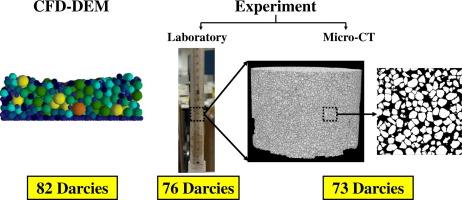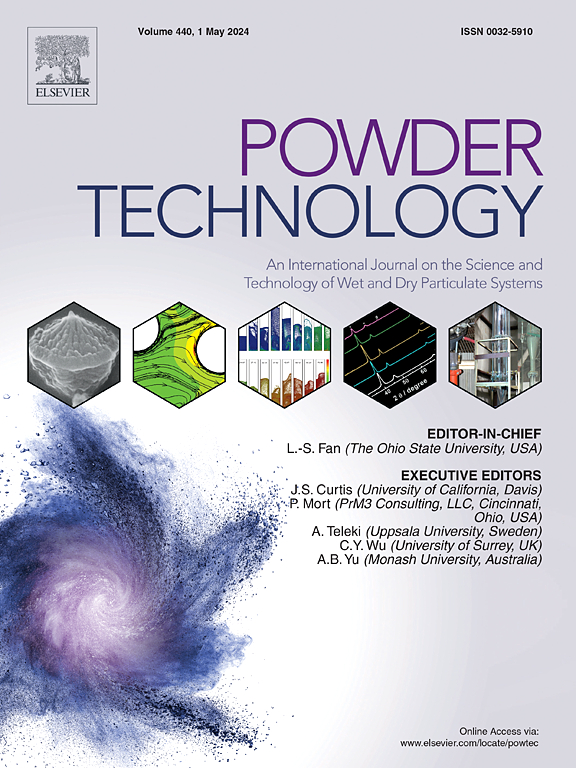Spatially resolved CFD-DEM model with innovative experimental validation methods to improve understanding of sand retention in oil and gas wells with the consideration of filter-beds on standalone screens
IF 4.5
2区 工程技术
Q2 ENGINEERING, CHEMICAL
引用次数: 0
Abstract
Coupling CFD and DEM is commonly used to study particle-fluid flow in sand retention systems for oil and gas wells, addressing the limitations of laboratory experiments and reliance on empirical data. These numerical studies aid in optimising standalone sand screens, which are favoured over gravel-pack completions for cost-effectiveness. However, such studies overlook the critical role of the bulk filter-bed in retaining permeability for both particulate and fluid phases. This paper presents a robust numerical methodology using resolved CFD-DEM to model a sand retention system that accurately captures filter-bed permeability, which has a greater impact on sand production and retained fluid productivity than the screen itself from a long-term perspective. The numerical model's accuracy is validated through a novel experimental methodology, which involves benchmarking the numerically derived porosity and single-phase permeability against micro-CT imaging of the filter-bed. Results show strong consistency between the numerical model and micro-CT imaging of the laboratory-derived filter-bed. This validated model provides a solid foundation for running more accurate sand retention tests and improving standalone sand screen selection criteria. Future work will explore the effects of varying parameters on the filter-bed formation to determine optimal conditions for maximising sand retention while maintaining hydrocarbon productivity from a long-term perspective.

空间分辨 CFD-DEM 模型与创新实验验证方法,通过考虑独立滤网上的滤床,加深对油气井中砂滞留的理解
将 CFD 和 DEM 结合起来,通常用于研究油气井固沙系统中的颗粒流体流动,以解决实验室实验的局限性和对经验数据的依赖。这些数值研究有助于优化独立的砂筛,与砾石层完井相比,独立的砂筛更具成本效益。然而,这些研究忽略了大块滤床在保持颗粒和流体相渗透性方面的关键作用。本文介绍了一种稳健的数值方法,使用解析的 CFD-DEM 对滤层渗透性进行建模,从而准确捕捉滤层渗透性,从长远角度来看,滤层渗透性比滤网本身对产砂和保留流体生产率的影响更大。该数值模型的准确性通过一种新颖的实验方法进行了验证,即根据滤床的显微 CT 成像对数值推导出的孔隙率和单相渗透率进行基准测试。结果表明,数值模型与实验室滤床的显微 CT 成像具有很强的一致性。这个经过验证的模型为进行更精确的留砂试验和改进独立砂筛的选择标准奠定了坚实的基础。未来的工作将探索不同参数对滤床形成的影响,以确定最佳条件,在最大限度地保留砂子的同时,从长远角度保持碳氢化合物的生产率。
本文章由计算机程序翻译,如有差异,请以英文原文为准。
求助全文
约1分钟内获得全文
求助全文
来源期刊

Powder Technology
工程技术-工程:化工
CiteScore
9.90
自引率
15.40%
发文量
1047
审稿时长
46 days
期刊介绍:
Powder Technology is an International Journal on the Science and Technology of Wet and Dry Particulate Systems. Powder Technology publishes papers on all aspects of the formation of particles and their characterisation and on the study of systems containing particulate solids. No limitation is imposed on the size of the particles, which may range from nanometre scale, as in pigments or aerosols, to that of mined or quarried materials. The following list of topics is not intended to be comprehensive, but rather to indicate typical subjects which fall within the scope of the journal's interests:
Formation and synthesis of particles by precipitation and other methods.
Modification of particles by agglomeration, coating, comminution and attrition.
Characterisation of the size, shape, surface area, pore structure and strength of particles and agglomerates (including the origins and effects of inter particle forces).
Packing, failure, flow and permeability of assemblies of particles.
Particle-particle interactions and suspension rheology.
Handling and processing operations such as slurry flow, fluidization, pneumatic conveying.
Interactions between particles and their environment, including delivery of particulate products to the body.
Applications of particle technology in production of pharmaceuticals, chemicals, foods, pigments, structural, and functional materials and in environmental and energy related matters.
For materials-oriented contributions we are looking for articles revealing the effect of particle/powder characteristics (size, morphology and composition, in that order) on material performance or functionality and, ideally, comparison to any industrial standard.
 求助内容:
求助内容: 应助结果提醒方式:
应助结果提醒方式:


